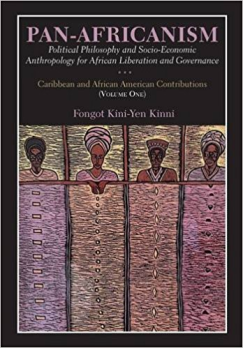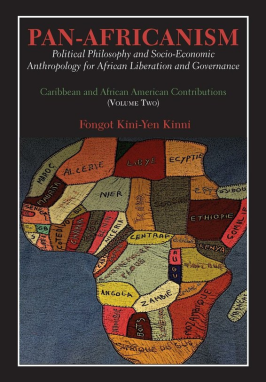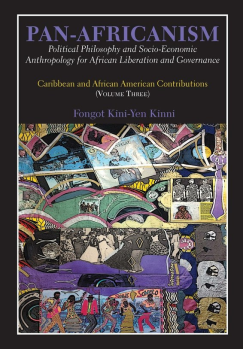 Book Review by Carolina Nve Diaz San Francisco, MS Medical Anthropology, Boston University School of Medicine.
Book Review by Carolina Nve Diaz San Francisco, MS Medical Anthropology, Boston University School of Medicine.
Dr. Fongot Kini-Yen Kinni is Dean of the Faculty of Law and Deputy Vice Chancellor of Research and Cooperation at Bamenda University of Science and Technology, Cameroon.He is a prolific researcher, writer, designer, artist, musician, philosopher and poet, who has traveled widely in Africa and the world.
Kinni, Fongot Kini-Yen. Pan-Africanism: Political Philosophy and Socioeconomic Anthropology for African Liberation and Governance, Research and Publishing CIG, Bamenda, Cameroon, 2015, Volumes 1-3, ISBN: 9956762768.
This work is aparamount contribution to humanity.This is a three-volume set that documents the history and trajectories of the worldwide ideological movement of Pan-Africanism. Kinni argues that the universal unity of the movementto fight racism and oppression with self-determination and liberation is an unbreakable force for social change that remains pertinent and alive today.
Kinni uses historical records and anthropological perspectives of cultural and socioeconomic diversity to collect and spread through this work,the struggles of Africans and people of African descent across the world, to overcome the tragedy and trauma perpetuated upon them because of the color of their skin.The author admires the effortsof the contributors to Pan-Africanism,anddedicates celebratory poetry to their strong sense of consciousness, agency and compromise to communal mobilization and emancipation.Kinni demonstrates how the global and pluralist nature of Pan-Africanphilosophiesand social movementsagainst hate and marginalization, succeedsbecause of solidarity, and heencourages us all to unite in our persistence to fearlessly face and eradicate abuse today.
Volume Oneexplores the ethno ideological and religious foundations ofslavery and xenophobiathat oppressed Africans and their descendants for over two thousand years.Kinni portrays the violence and the psychological trauma of supremacist imperialismsas the Black Holocaust, and horrors and crimes against Humanity, and he then proceeds unveiling the formation, influence, rise, as well asthe contradictions ofBlack consciousness and freedom movements. Combatants from all walks of life and with different perspectives for paths of freedom, joined forces to express and addressresolutions to eradicate their common problem of critical social, political and economic conditions. Pan-African movementsworldwide found new platforms for expression and positive action inthearts and literature, sports, and the walks against fear and civil rights demonstrations.
The last section of Volume Oneis dedicated to womenleaders of the movement of self-determination and liberationfrom ancient history to contemporary times across the world, however, the presence of Black feminist women and precursors of Black radical feminismis quite limited throughout theentire set. Although Kinni stresses that his work is based on a “balanced gender approach and diagnosis of women actors”, he also rightly points out the exclusively masculine endeavor in Pan-Africanism. This shows that more research work is needed to document the stories of committed Black women against invisibility.

Kinni warns us of the blocking effects of the internal conflicts ofPan-Africanism. The promoting of unity and solidarity among Africans and their supporters in the diaspora, prepared thelaunching of organizations of an Africa unitedto coordinate efforts and establishpeace and strong defenseswith sovereignty and territorial integrity.However,the pervasive strains of post-independence, such as budgetary economic dependency on the old colonies, the “new and self-interested African front-door ministers of State for public work”,and long standing and new challenges embedded in divisions and competitions among revolutionary actors who later turned into dictators and neo-colonial supporters, called for serious revisions, new insights and alternative strategies.

The author inspires us to reflect on the reasons why Pan-Africanism is currently fading off in the hands of corruption, misuse and deception, and under the control of African leaders who, in the name of Pan-Africanism, plunder most of African resources and leave the indigenous community in total abject poverty. Kinni questions why bad governance, minimum standards of health and education, lack of control over resources, White supremacism, marginalization, police violence and brutality against Black male civilians, failing infrastructure, and unequal treatment before the law continue to plague us.
Pan-Africanism is alive. The struggle for self-determination and liberation is not over. As a conclusion,Kinni proudly writes about our fellows’contemporary awareness and consciousness of their political and economic environment, and the social risings in Africa, America and Europe against long standing racism. This is what Kinnirefers to as the Renewal of Pan-African renaissance. Pan-Africanism now is a call for the principle of strategic integration as we tackle all of the challenges facing us today.Kinni offers alternatives and suggestions for the renewal and renaissance of the “oneness of view,” unity of action, the principle of collaboration with like-minded institutions, and like-minded bodies for the interest to the greater common good. This is a must read for thoseconcerned about the wellness of humanity and peace in our world.
Advertisements &b; &b;